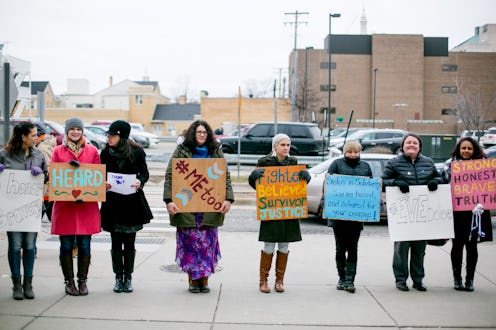News
California Is One Step Closer To Banning NDAs For Sexual Harassment Victims

While there's recently been less news related to the #MeToo movement, it's still making an impact across the nation. This week, news broke that California may ban NDAs for sexual harassment and assault cases in the workplace, which would get rid of an common way that perpetrators have managed to avoid the consequences of their actions.
The California state legislature passed two bills to protect survivors of sexual harassment and assault, and the bills are waiting for Gov. Jerry Brown's signature, according to BuzzFeed. The first bill, passed on Thursday, would bar companies from making secret settlements that force sexual harassment survivors to sign nondisclosure agreements. If the survivor wanted an NDA, they would still be able to obtain one. The second bill, passed on Wednesday, would forbid companies from including mandatory arbitration and NDAs in employment contracts.
According to the ACLU, NDAs are frequently among the reasons why a survivor of sexual harassment or assault might not want to share their story. Famously, Harvey Weinstein relied on NDAs to keep his alleged victims quiet for years, as the New Yorker reported (Weinstein has denied all of the allegations against him).
NDAs are an exceedingly common feature of employment contracts, but their chilling effect for victims of sexual harassment and assault is one way in which they've gone too far, according to the Harvard Business Review. The bill in California wouldn't ban them outright, but it would prevent their use in cases related to sexual misconduct.
The senator who introduced the bill, Sen. Connie Leyva, said in press release:
Our state must again stand with victims of sexual harassment and assault by ending this unjust practice of secret settlements that keep these aggressors unaccountable and able to prey on other victims. These perpetrators should not be allowed to endanger others or evade justice simply because they have a fat wallet at their disposal.
Leyva introduced the bill back in October 2017 in reaction to the reporting on Weinstein, according to Variety. The Hollywood producer wasn't the only one who allegedly leaned heavily on NDAs as a way to protect his reputation, however. Several of Bill O'Reilly's alleged victims were also bound to silence as per the terms of their settlement agreements, according to the New York Times (O'Reilly has repeatedly denied ever having committed sexual harassment).
Former Fox News executive Roger Ailes reportedly used the same strategy with women accusing him of sexual harassment, according to the Times. Ailes, who died in May of 2017, also denied all allegations of sexual harassment. Ailes’ lawyer, Susan Estrich, tells Bustle that the settlements were negotiated by Fox, not by Ailes. "We did our best to deal with a difficult situation with respect and dignity for all," she added.
Bustle has reached out to representatives for Weinstein and O'Reilly for comment.
Forbes wrote that pushes to ban workplace NDAs from being used against survivors of sexual harassment and assault were one of the first results of the #MeToo movement, and should these two bills be signed into law, they would count as huge successes for the movement. Washington passed a similar law in April, and Congress began debating one at the federal level in July — although it hasn't moved forward. If California's bills pass, then the nation's biggest state would still be leading the push forward for survivors of sexual misconduct.